
Want to do your own SEO as a musician? Before you start optimizing your website it’s crucial, in any SEO project, to first get to know your keywords.
To begin your overall SEO strategy for marketing your music, read over SEO for musicians: it starts with the fan journey as a first step.
Then, let’s talk keywords.
There is nothing more fundamental to search engines than keywords. Keywords are how we humans directly communicate with the search engines.
The Google homepage, after all, is nothing more than a simple text box for you to enter your search keywords.
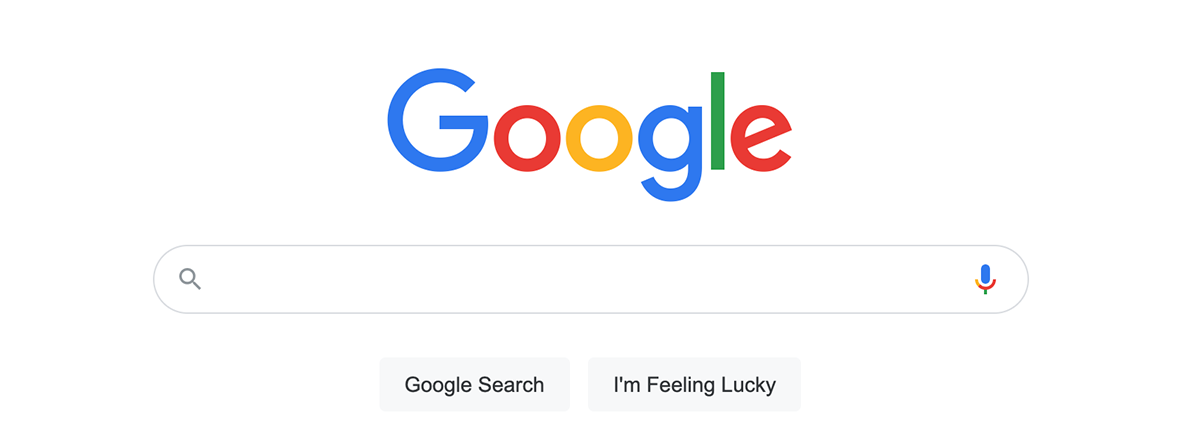
SEO isn’t just about ranking better in search engines. It’s really about ranking better in search engines for certain keywords that are relevant to what you’re promoting, and that people are searching for.
Only a very tiny slice of all the Google searches in the world are going to be relevant to you and your music. And within that slice, some of those keywords will be searched more than others.
So keyword research is about identifying what those keywords are, and which ones are the most important to you. That way you can focus your SEO work towards ranking for the keywords that will be most effective for promoting your music.
Promote your music with built-in tools to optimize your website for search engines. Try Bandzoogle today!
Basic law of SEO: no two keywords are equal
It might seem a little obvious that some keywords are searched more often than others, but let’s look at a practical example of why it matters.
Say you’re a piano teacher in Albany, NY. Without doing any keyword research you might assume that getting high search rankings for a keyword like “piano teacher albany” will bring traffic to your website.
But actually, people are more likely to search for “piano lessons albany”. And they’re even more likely to search for “piano lessons albany ny”.
We know this thanks to a tool provided by Google:
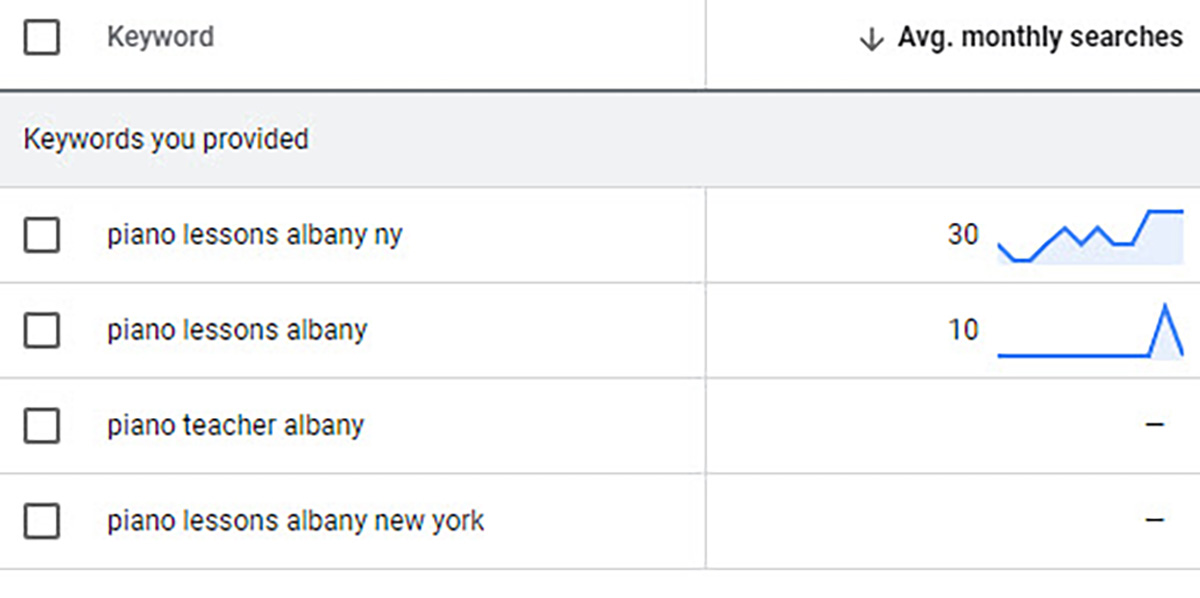
(We’ll show you how to get this data yourself in a minute).
What this data says is that there are roughly 30 searches per month for the keyword “piano lessons albany ny”. There are almost no searches at all for “piano teacher albany.”
So that makes it pretty clear which keyword would bring you more visitors, if you had high search engine rankings for them. You would want to prioritize "piano lessons albany ny" as a keyword to target.
This is a pretty simplistic example, but the point is that by doing your research first, you can focus your energy on keywords that will provide you with results.
The most important keywords for your band
We talked about how some keywords get searched more than others, but now let’s touch on relevancy - that is, choosing target keywords are relevant to what you’re offering or promoting.
We’re going to focus on “brand” vs “non-brand” keywords first because it's particularly important for musicians.
As a musician, a “brand” keyword is any keyword that includes your band or artist name. It could also be the names of people in your band, track titles, album names, tour names, or anything that relates specifically to you and your band and your music. It could even be lines from your lyrics.
An example of a brand keyword for Bandzoogle member Elephant Stone would be “elephant stone discography”.
Brand keywords are the ones that matter to you most as a band or artist.
Looking back at the first post in this series, SEO for musicians: it starts with the fan journey, you may remember that the Engagement and Purchase steps are where search engines play their biggest role in your music marketing. After people have discovered you, they might go to a search engine to look specifically for you or your music. That’s where brand keywords come in.
On the other hand, a “non-brand” keyword is any keyword that doesn’t include words specific to you, your band or your music.
An example of this would be “indie band in la”.
A non-brand term like this would be associated with the Discovery stage of the Fan Journey, and of course as we touched on in the previous article people don’t discover new music using search engines.
So the basic idea here is that your brand terms will be the most relevant to you because people are simply not going to find you in search engines until they’ve already heard of you - at which point they may look specifically for you.
Non-brand keywords will not be useful or relevant to you as a musician, with one exception. If you are offering a traditional business service or product, such as local music lessons, your SEO strategy is going to be more similar to a typical business where non-brand keywords would be your main focus.
How to research your band keywords
Keyword research is what every SEO expert starts with before they do any actual SEO work. Without it, you’re just working blindly. Keyword research lights the way, and you can do it yourself.
Here’s a quick tour of how to do your own keyword research using the Google Ads Keyword Planner tool.
Step #1: Access the Google keyword tool
The Google Ads Keyword Planner is the keyword research tool of choice for many SEO experts. It’s free, but the catch is that it’s accessible only from within an Google Ads account, so you’ll need to take a few minutes to create one if you don’t already have one.
There are other keyword research tools available but they either cost money or are very limited. The Google Ads Keyword Planner is unfortunately a hassle to access, but it offers the best source of keyword data available and doesn’t cost anything as long as you don’t launch an active campaign.
Once you’ve created a Google Ads account and logged in, go to the “Keyword Planner” from the Tools menu, as you can see below. When you click on it, you should get something like this.
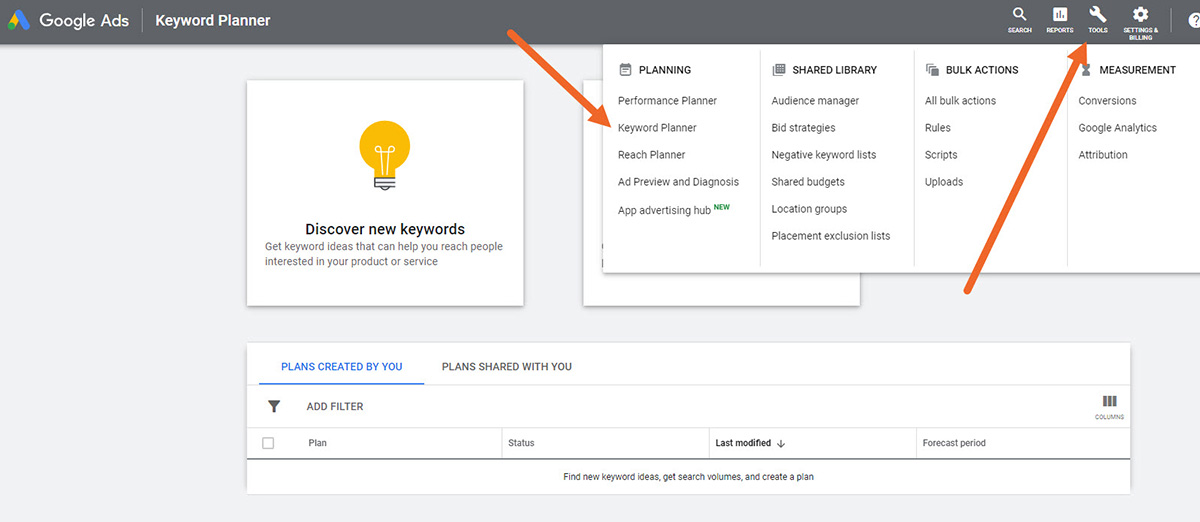
Choose “Discover new keywords”.
Step #2: Enter seed keywords
In the next screen, we can plug in some keywords. We need to seed the tool with some ideas to start with.
We entered the band name of Bandzoogle member Wolfmother as our example, but you could enter your band name:
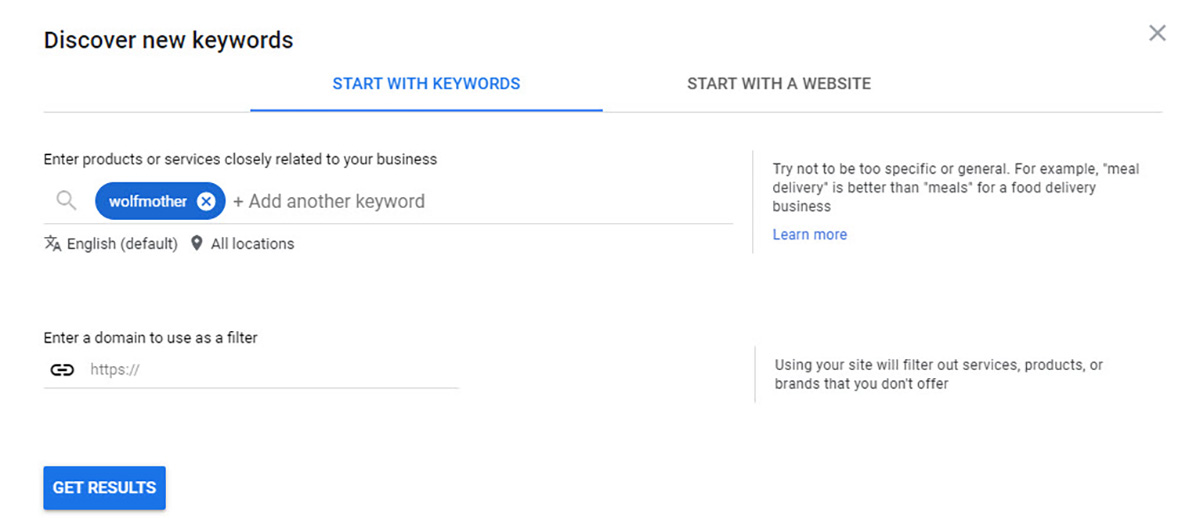
Click on the "get results" button.
Step #3: Sift through to find your keywords
Based on our seed keyword, the tool has given us data on how often people are searching for it, as well as a long list of other related keyword ideas.
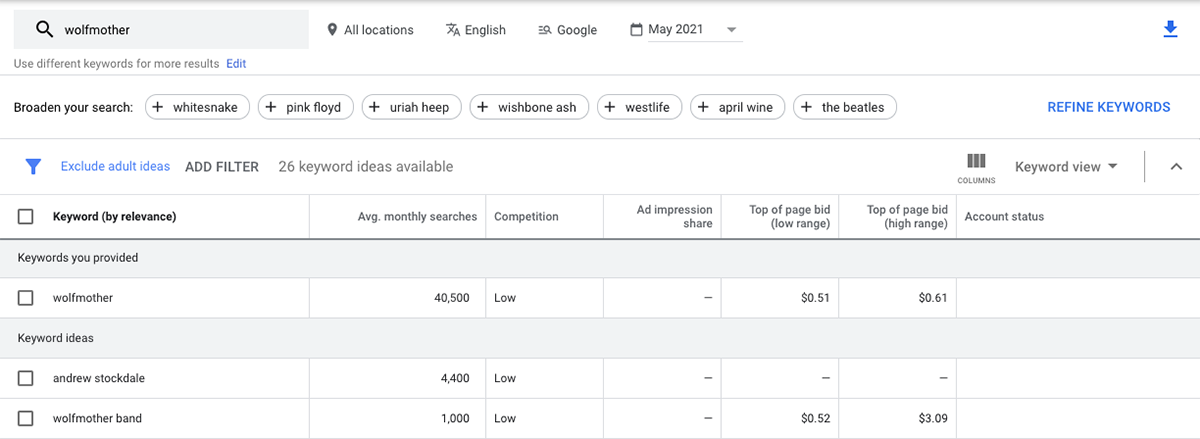
So in this image, Google is telling us that on average there are 40,500 searches worldwide every month for the keyword “wolfmother”.
We also have all of these great keyword suggestions—along with the average monthly searches for each of them—which we’ll sift through and organize later. To help with this, try downloading your keyword ideas to a spreadsheet using the “Download Keyword Ideas” link on that page.
Building your band keyword list
The next step is to come up with more seed keywords. To do this, we brainstormed some ideas about what people might search for:
- People looking for tour dates (tour, live, tickets, concerts, etc.)
- Lyrics and tabs
- Specific albums and songs
- Wiki and discography
- Merch, like vinyl, T-shirts and posters
- Streaming, YouTube and download (to listen, legally or illegally)
- Specific hooky lyrics from your songs that people might look up
This list could apply to just about any band. The key here is to think like a music fan—put yourself into the mind of your fans and try to imagine all the possible ways they might search for you or your songs.
Let's check out what Wolfmother fans are searching for.
We plugged all kinds of keyword seed ideas into the Google Ads Keyword Planner—one at a time—such as “wolfmother tickets”, “wolfmother vinyl”, “wolfmother songs” etc. We downloaded the results each time into a spreadsheet and then started over with a new seed keyword. Once we felt we had found everything we could, we sifted through and organized all the data manually in the spreadsheet.
This is the "research" part of keyword research, and it can take some time and patience. This was the end result.
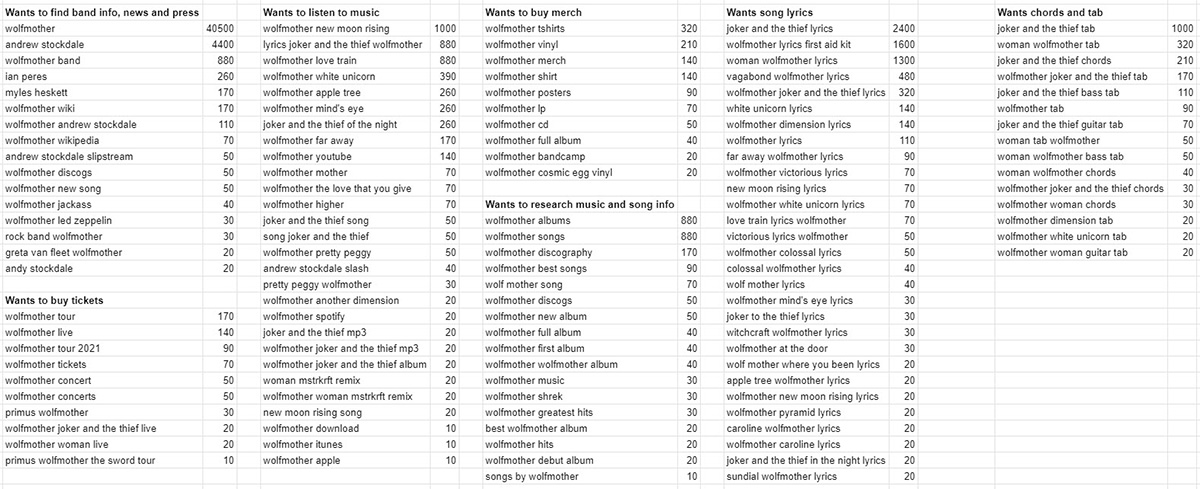
This isn’t a completely exhaustive list of keywords—we could probably find many more keywords worth targeting—but it’s enough to get an idea.
We grouped our keywords together based on what we think the searcher is trying to accomplish (and where they might be in the Fan Journey).
For example, someone searching “wolfmother tour” is probably trying to do something fairly similar to a person searching for “wolfmother tickets.” So we grouped those together.
We also sorted the keywords in each grouping by average monthly searches. This gives us a good idea of what keywords to prioritize—so we can focus on the ones people search more often.
Now give this a try with your band name. You might group things a little differently than we did based on what you think your fans are looking for.
Plug any relevant keywords into the Keyword Planner that you can think of, keeping in mind all you’ve learned up to this point about your audience and fan journey. See what comes up in the tool.
Make a list in a spreadsheet of all of the relevant keywords you find that have some monthly searches. Record the keyword and the monthly searches, like we did in the screenshot above, and sort and organize them.
This is going to be your Band Keyword List for SEO—the keywords that are most important for you to pay attention to. You’ll refer back to it often.
Other ways to brainstorm band keywords
The keywords you get from the Google Ads Keyword Tool are only as good as the seed keywords you give it. It’s also incomplete and imperfect. It won’t give you all possible keywords people actually use.
So you may want to spend some time digging around and coming up with other seed keywords that you think your fans may search.
Some places you can dig around are:
- Google Suggest. Start typing ideas into Google, and see what other keywords it suggests. You can also try the same thing with other search engines.
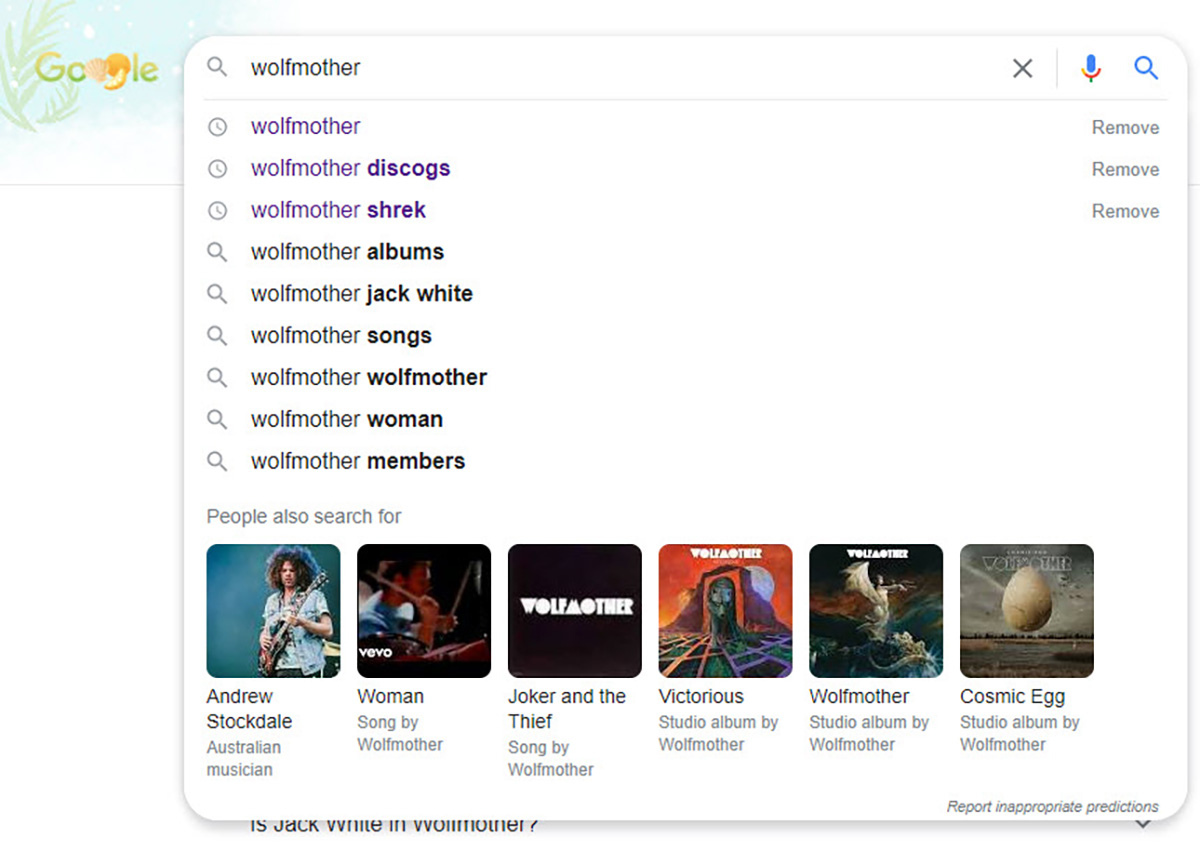
- The free but limited Wordtracker tool, which you can find here https://www.wordtracker.com/
- The free Wordstream tool here https://www.wordstream.com/keywords
- Google Trends, also free here https://www.google.com/trends/
- Your band members, friends and anyone else who can help you brainstorm
Plug all of your ideas back into the Google Ads keyword tool and add any that get searches into your Band Keyword List.
What to do when you get no searches
If you’ve done this exercise and you’re finding that there aren’t any searches of your target keywords at all, that’s ok!
If you’re relatively unknown you still want to make sure that even if just one person searches for you, they can find you in Google. Every search and every fan counts at this point.
And of course just because no one is searching for you right now doesn’t mean they won’t be later.
So, for now, consider just focusing on looking professional in search results for your band name. Don’t worry too much about other keywords yet unless there’s something specific you think people might look for, and don’t spend too much time on SEO just yet.
As you’re building your fan base, every now and again go back to the Keyword Planner tool and check your keywords to see if people are starting to search for you.
What to do when your band name isn’t unique
Sharing your band name with other things (other bands, or famous people, or famous things) can be problematic for your SEO.
If you haven’t chosen a band or artist name yet, it can be a good idea to Google your ideas before you commit, to make sure no one else already has it.
But it’s not always possible to come up with a totally unique name. Like the following examples.
Solo artists with common names
Unless you have a really unusual name, chances are someone else somewhere has the same name as you. So if you’re a solo musician using your own real name, you might end up competing in search engines with someone else, and they might not even be a musician.
Bandzoogle member David Husted, for example, has this problem. A quick Google search for his name shows the scope of what he’s up against.
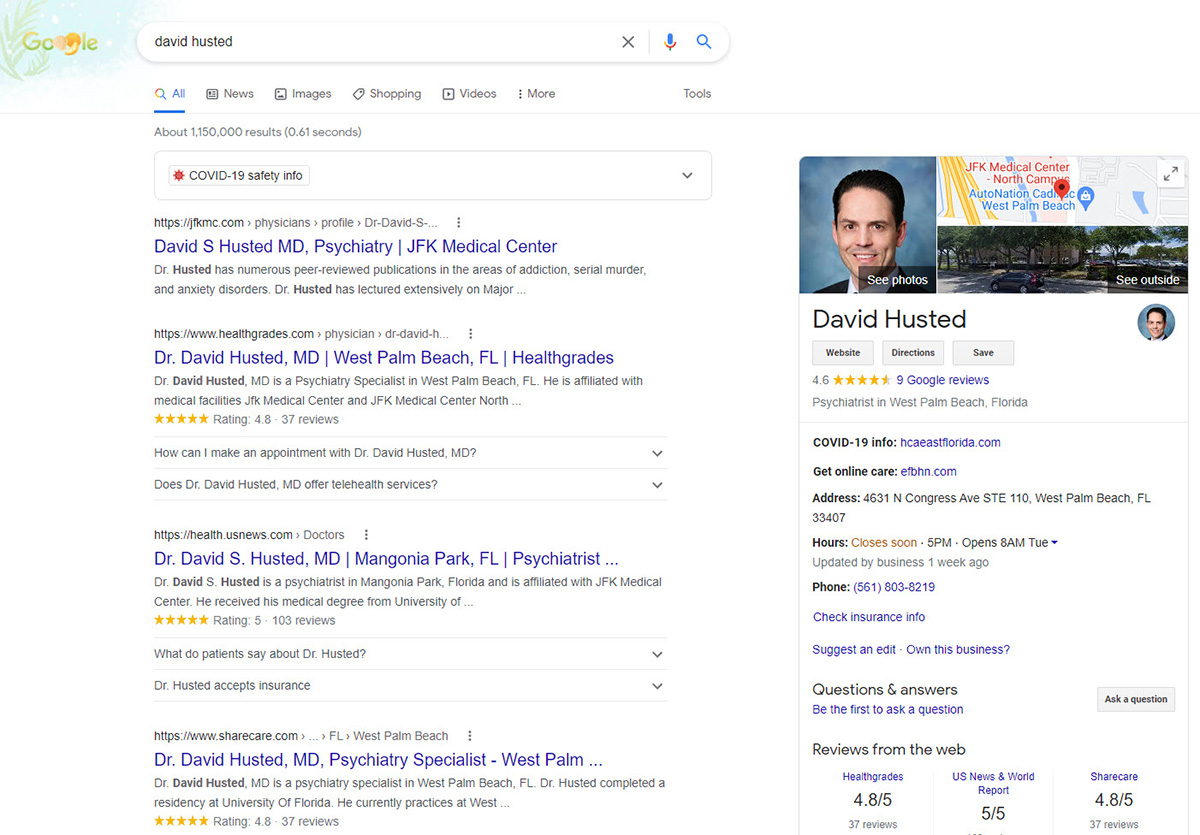
There is a different David Husted—a psychiatrist—who occupies most spots on the first pages of search results, as well as the large “knowledge panel” on the right side of the page.
To make things even more challenging, there is another notable David Husted who is a retired professional ten-pin bowler.
David Husted the musician is nowhere to be seen unless you click through to the second page of results in Google.
We’ll get more into this topic in future posts, but the gist of this problem is that—when it comes to the names of "notable people"—the most famous person wins the search results.
The thing is—this is kind of inconvenient for people who are looking for David Husted the musician. Those people might decide to modify or refine their search term to be more specific, such as in this example:
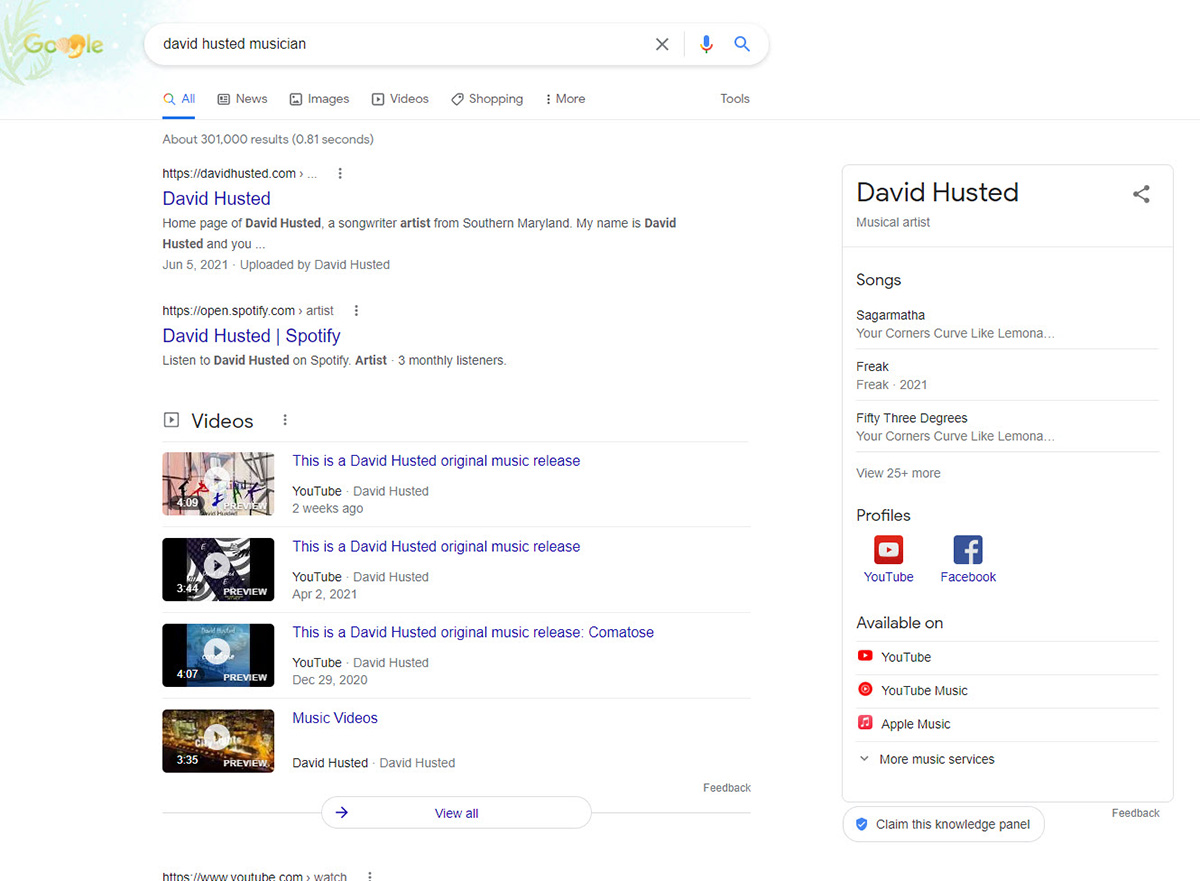
Now with this refined search we get the ideal full page of results for David Husted the musician, with their website homepage at the top and the correct knowledge panel on the right.
So if you're an artist using your own name, this is something you'll need to be aware of when you're researching your keywords. You might want to look up search volumes for those modified or refined keywords as well.
For the record, this problem applies to yours truly—I share the same name and Google search results with a retired NFL football player.
Band names with common phrases
Band names that use common phrases, or phrases that have other meanings, can also be a challenge. This is the situation for Bandzoogle member Pink Elefants.
When you search for their band name in Google, the first page of results is filled with information related to the expression “seeing pink elephants”—even though the spelling is a little bit different.
If this situation applies to you, again you’ll want to think about the refined keywords your fans might use to find you.
Band names with words of famous things
Some band names include a word that also happens to be a word for something else.
Bandzoogle member Kenya, for example, has this problem. When you search in Google you will only get results for Kenya the country because, well, a large country is about as famous as you can get.
So in this kind of situation, again we’d want to look into any refined keywords.
Another important thing to keep in mind when building your Band Keyword List is that searches for your band name might be mixed in with searches for the “other thing.”
For example, let’s look at some keywords that might apply to Kenya the artist in the keyword tool.
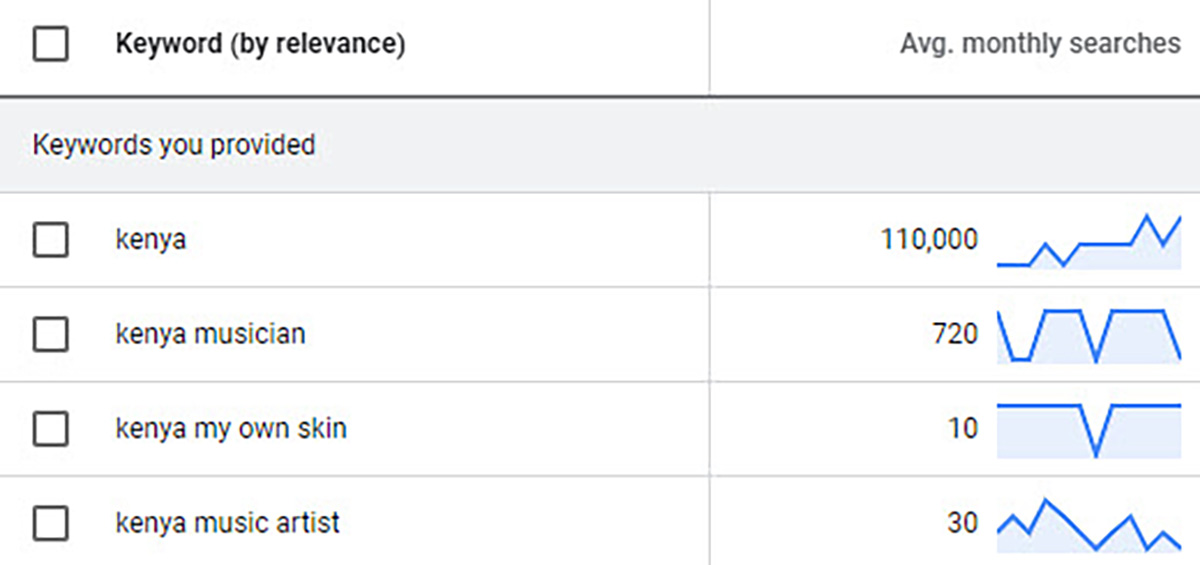
It’s fairly obvious here that nearly all searches for the keyword “kenya” would be by people who are looking for information about the country.
Even most searches for the keyword “kenya musician” are probably by people searching for Kenyan musicians, rather than Kenya the musician.
On the other hand a keyword that includes the artist’s album name—”My Own Skin”— is probably very specific to the artist.
So this is something important to keep in mind when building your Band Keyword List.
Understanding the long tail keywords
We can’t close off an article about SEO keywords without mentioning the long tail.
SEO people like to categorize keywords into three main groups:
- Short tail. For example “wolfmother tour”
- Medium tail. For example, “wolfmother show toronto”
- Long tail. For example “when does wolfmother play next in toronto 2022”
Here are some other examples of long tail keywords people might use:
- “when is the next wolfmother show happening in toronto 2022”
- “what is the next concert date wolfmother toronto”
- “wolfmother tour dates toronto may 2016”
We could probably make a list of thousands of other variations of those examples.
When people search in Google, around 90% of the time they’ll use a keyword that is searched only a few times a month. In fact about 15% of the time they’ll use a keyword that has never been searched at all, ever. Those are the long tail keywords, and they won’t show up in your keyword research.
Here’s what your typical long tail graph looks like, courtesy of Semrush.
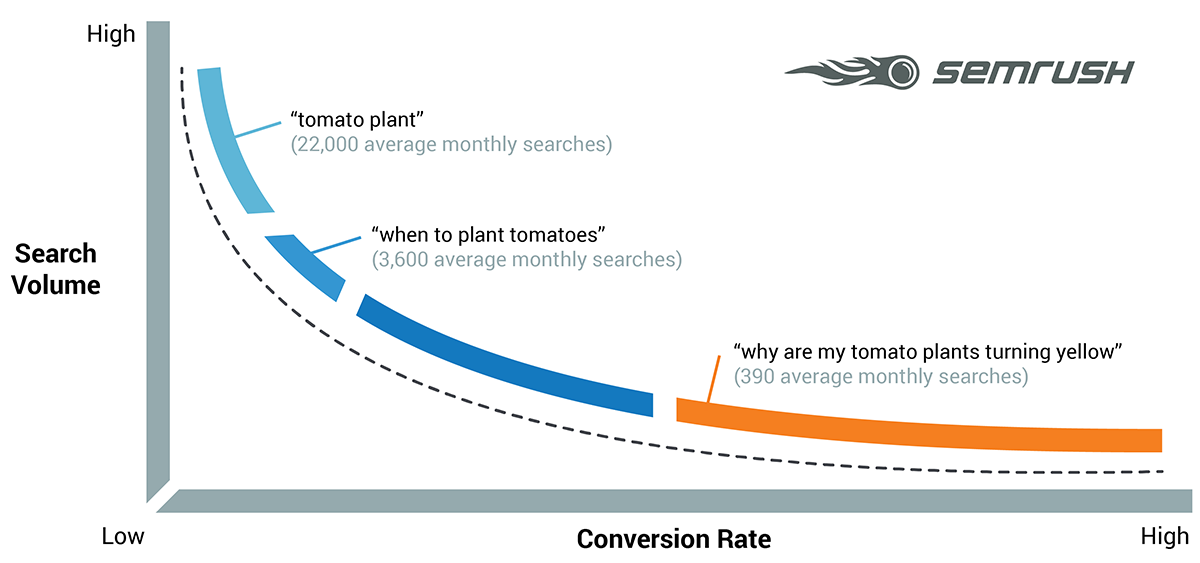
This means that the people who are searching for your exact band name and other short tail keywords - which would fall under the light blue section of the graph - makes up only a small part of the total keywords people use to actually search for you.
Your Band Keyword List can really only include short and some medium tail keywords, which means that even if you do really thorough research you still won’t be able to see every single keyword that will ever be searched related to your band.
The rest of the searches, in the long tail, will be for keywords that, on an individual basis, get searched very rarely. That’s just a reality of SEO that you need to know about.
But your Band Keyword List will still give you a pretty solid understanding of what people tend to look for when it comes to your band, based on how the short and medium tail keywords are searched. And that will give you the information you need to move on to the next stages of your SEO optimization.
The takeaway: Build your band keyword list
Now that you know what keyword research is, why it matters, and how to do it, it’s time to research your own band’s keywords!
In follow-up posts, we’re going to dig deeper into SEO. You’ll want to have your Band Keyword List handy any time you work on your band SEO, and refer back to it so that you know what keywords are the most important to you.
And if your band just doesn’t have any keywords with searches yet, that’s ok—there’s still plenty you can do.
Working on SEO for your music website? Read the other articles in this series:
- Part 1 - SEO for Musicians: It Starts With The Fan Journey
- Part 2 - SEO Keyword Research for Musicians
- Part 3 - Music SEO: Know Your SERPs
- Part 4 - Optimizing Your Band Website for SEO
- Part 5 - How to Get a Band Knowledge Panel
- Part 6 - How to Optimize Your Band Schema for SEO
Why not share this with your friends?
Build a stunning band website and store in minutes
- Promote your music on your own unique website.
- Sell music & merch directly to your fans. Keep 100%.
- Grow your fan base with built-in marketing tools.
Free 30 day trial, no credit card needed.


Comments